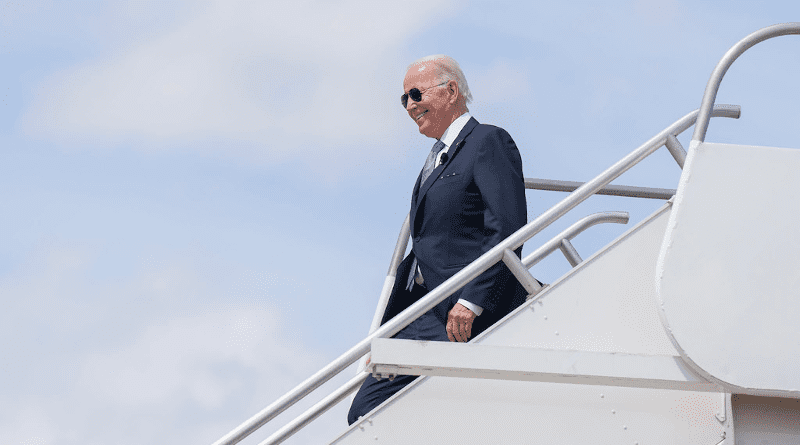Biden’s New Strategy For The Middle East – OpEd
By Amin Bagheri
On June 14, 2022, the White House announced that US President Joe Biden would visit Israel, the West Bank, and Saudi Arabia in mid-July. This is Biden’s first trip to the Middle East since taking office. Russia’s war against Ukraine was an unexpected global tectonic development that could significantly change the actual dynamics of US global power. After the Russian military invasion of Ukraine, the United States sought to revive the alliance of Washington and European countries and strengthen the Western alliance in the form of NATO. Now is the time to ensure the success of the Western Front by creating a Washington-led bloc in the Middle East to ensure its success.
A trip to the Middle East will allow Biden to focus on a wide range of issues of disagreement and mistrust between old allies by stopping in Israel and Saudi Arabia. The first goal of this trip could be to explore the formation of a new bloc in the Middle East. The White House expects the formation of a US-led bloc in the Middle East based on a genuine partnership between Israel and the Gulf Cooperation Council, especially the United Arab Emirates and Saudi Arabia, as well as other Arab countries such as Egypt and Jordan, to be a significant step forward in the relations between Washington and the Arab countries of the Persian Gulf.
Since the signing of the Abraham Accords in August 2020, Israel has been working on expanding diplomatic relations with the United Arab Emirates, Morocco, and Bahrain through diplomatic ties. The process of normalizing Israel’s relations with its neighbors in the complex Middle East region is of great strategic importance to Washington. It can be said that the improvement of relations between Israel and Saudi Arabia, as well as the relations between the two countries with the United States, will establish diplomatic relations with other key Arab countries. The United States strongly supports Israel’s integration into the broader Middle East region. It expects the Middle East region to be on the verge of significant change by forming a military bloc between Israel and some Arab countries.
Biden will also hold talks with the Palestinian Authority in the West Bank to announce his support for a two-state solution. Biden’s planned trip to the West Bank and Palestine, on which US Middle East policy has focused for decades, is particularly important in the long run.
The third goal is to examine oil production and prices, which could change the idea of the United States leaving the Middle East as the Gulf states take more responsibility for their security. In the wake of the war in Ukraine, the United States has once again needed Saudi Arabia and its neighbors to pump more oil to lower world prices, support various UN resolutions opposing an invasion of Ukraine, and help with Russian sanctions. If Saudi Arabia pledges to violate its production quota agreement with Russia and accept prices at more reasonable levels by increasing oil production, Riyadh oil will replace Russian oil exports to Europe. The turnaround in Biden’s foreign policy toward Saudi Arabia is a win-win deal for both sides. For Saudi Arabia, a strategic agreement with the United States would be desirable if it committed the United States to strengthen bilateral defense and security cooperation to counter common threats and promote regional peace and stability. The US commitment to maintaining the balance of power will provide Saudi Arabia with the tools it needs to defend itself through closer defense cooperation with the United States. If Biden pledges to provide Saudi Arabia with the weapons it needs to increase its defense capabilities, it could rely on the United States to play a role in ensuring security in the face of regional threats, especially from Yemen’s Houthis.
Biden is expected to focus on repairing strained relations with key Arab countries and finding ways to restore their trust in mitigating global crises. In the meantime, it can be said that Biden has found that US global and geostrategic power is tied to the Middle East and that withdrawing from the Middle East is detrimental to US interests. The Middle East, meanwhile, has found that there are other alternatives to the United States after the United States withdrew from the region, turning to Russia and China.
In conclusion, the real dynamics of world power have been significantly altered by the Ukraine war and the United States, while not directly involved in the war. But it has gained a great deal of credibility for resisting Russian aggression by European countries and NATO. The United States will form a new geopolitical alliance in the Middle East in post-war Ukraine to perpetuate the Western alliance in Europe. If Biden succeeds and his administration can harness the region’s potential to reduce global crises, a new Middle East strategy will be devised for the White House.
Amin Bagheri is a Research Fellow at the International Studies Association in Tehran. His primary research interest lies in international relations, transnational governance, international peace, and conflicts in the Middle East.

